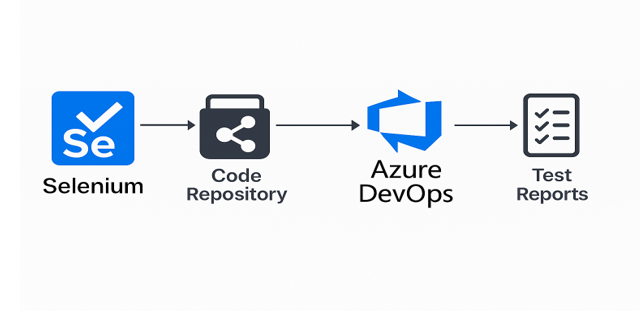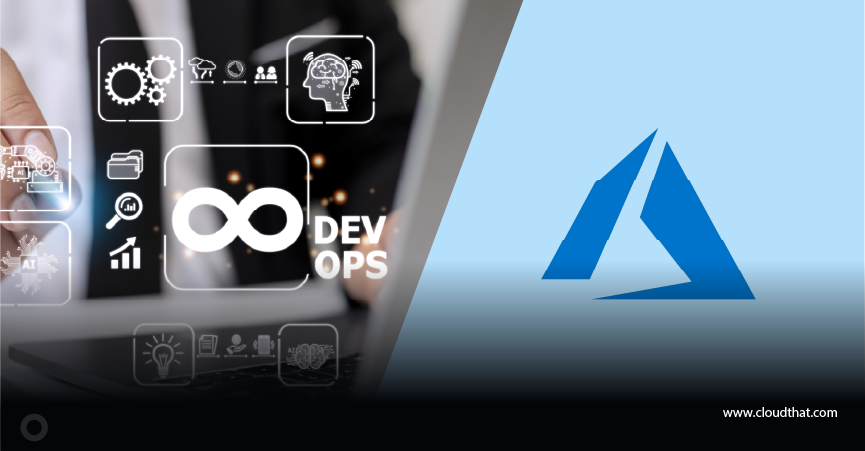|
Voiced by Amazon Polly |
Selenium is one of the most widely used open-source frameworks for automating web browser interactions, particularly for testing purposes. On the other hand, Azure DevOps offers a suite of tools for managing the software development lifecycle (SDLC), including continuous integration and delivery (CI/CD). Integrating Selenium with Azure DevOps enables automated test execution as part of your deployment pipelines, ensuring higher code quality and faster release cycles.
In this blog, Lets Walk through the process of integrating Selenium with Azure DevOps, and understand its relevance, setup steps, and benefits — all from a practical, implementation-focused lens.
You can download selenium for free from this link: https://www.selenium.dev/downloads/

Start Learning In-Demand Tech Skills with Expert-Led Training
- Industry-Authorized Curriculum
- Expert-led Training
Why Integrate Selenium with Azure DevOps?
Modern software development practices thrive on automation, and test automation is a critical component. By combining Azure DevOps with Selenium, teams can:
- Automate regression testing during CI/CD pipelines.
- Detect issues early in the development lifecycle.
- Deliver faster, more reliable releases.
- Ensure consistent environments through agent-based testing.
Prerequisites for Integration
Before you begin, ensure the following are in place:
- Azure DevOps organization and project
- Selenium test scripts written in a supported language (e.g., C#, Java, Python)
- Code repository on Azure Repos or GitHub
- Test framework (e.g., NUnit, TestNG, Pytest)
- Azure DevOps agent installed (Microsoft-hosted or self-hosted)
Step-by-Step Integration Guide
- Set Up Your Repository
Ensure your Selenium test scripts are version-controlled in a repository connected to Azure DevOps. For example, using Azure Repos Git or GitHub simplifies integration with build pipelines.
- Configure the Build Pipeline
Go to Azure DevOps > Pipelines > Create New Pipeline and follow these steps:
- Select the repository where your Selenium scripts reside.
- Use the YAML pipeline or classic editor to configure your pipeline.
- Install dependencies (e.g., browser drivers, test frameworks).
Sample YAML snippet for a .NET Selenium project:
yaml
|
1 2 3 4 5 6 7 8 9 10 11 12 13 14 15 16 17 18 19 20 21 22 23 24 25 26 27 28 29 30 31 32 33 34 35 36 37 38 39 40 41 42 43 44 45 46 47 48 49 50 51 52 |
trigger: - main pool: vmImage: 'windows-latest' steps: - task: UseDotNet@2 inputs: packageType: 'sdk' version: '6.x' - task: DotNetCoreCLI@2 inputs: command: 'restore' - task: DotNetCoreCLI@2 inputs: command: 'build' - task: DotNetCoreCLI@2 inputs: command: 'test' arguments: '--logger trx' |
- Set Up Test Plans and Reports
- Integrate Azure Test Plans to manage and visualize your test cases.
- Publish test results using the PublishTestResults@2 task in YAML to visualize results in Azure DevOps UI.
yaml
|
1 2 3 4 5 6 7 |
- task: PublishTestResults@2 inputs: testResultsFormat: 'VSTest' testResultsFiles: '**/*.trx' |
Best Practices for Selenium-Azure DevOps Integration
- Use parallel test execution for faster feedback.
- Integrate browser testing with cloud services like Selenium Grid or BrowserStack for cross-platform compatibility.
- Version-control everything — not just code, but test data and environment config.
- Set up alerts for failing pipelines to ensure quick action.
For organizations adopting Azure DevOps, certifications (https://www.cloudthat.com/training/devops/) are available from cloudthat to upskill teams and ensure smooth CI/CD for their software application development.
Conclusion
The integration of Selenium with Azure DevOps enables developers and QA teams to automate testing workflows efficiently. With this setup, you not only streamline the testing phase but also embed quality directly into your CI/CD process. For teams aiming to adopt a shift-left testing strategy, this combination becomes indispensable.
For organizations adopting Azure DevOps, certifications (https://www.cloudthat.com/training/devops/) are available from CloudThat to upskill teams and ensure smooth CI/CD for their software application development.
Upskill Your Teams with Enterprise-Ready Tech Training Programs
- Team-wide Customizable Programs
- Measurable Business Outcomes
About CloudThat
CloudThat is an award-winning company and the first in India to offer cloud training and consulting services worldwide. As a Microsoft Solutions Partner, AWS Advanced Tier Training Partner, and Google Cloud Platform Partner, CloudThat has empowered over 850,000 professionals through 600+ cloud certifications winning global recognition for its training excellence including 20 MCT Trainers in Microsoft’s Global Top 100 and an impressive 12 awards in the last 8 years. CloudThat specializes in Cloud Migration, Data Platforms, DevOps, IoT, and cutting-edge technologies like Gen AI & AI/ML. It has delivered over 500 consulting projects for 250+ organizations in 30+ countries as it continues to empower professionals and enterprises to thrive in the digital-first world.

WRITTEN BY Kavya B.S
Kavya B.S is a Subject Matter Expert and MCT at CloudThat, specializing in Microsoft Azure. With 15 years of experience in training and academics, she has trained over 5,000 professionals to upskill in Architect, Administrator and Security. Known for simplifying complex concepts through real-world analogies, she brings deep technical knowledge and practical application into every learning experience. Kavya’s passion for teaching reflects in her unique approach to learning and development.


 Login
Login


 September 16, 2025
September 16, 2025 PREV
PREV











Comments